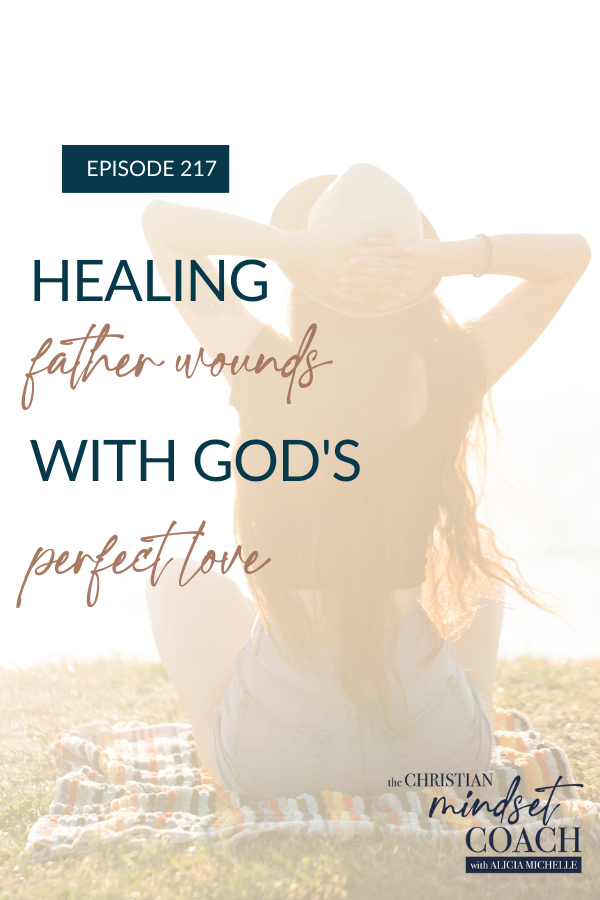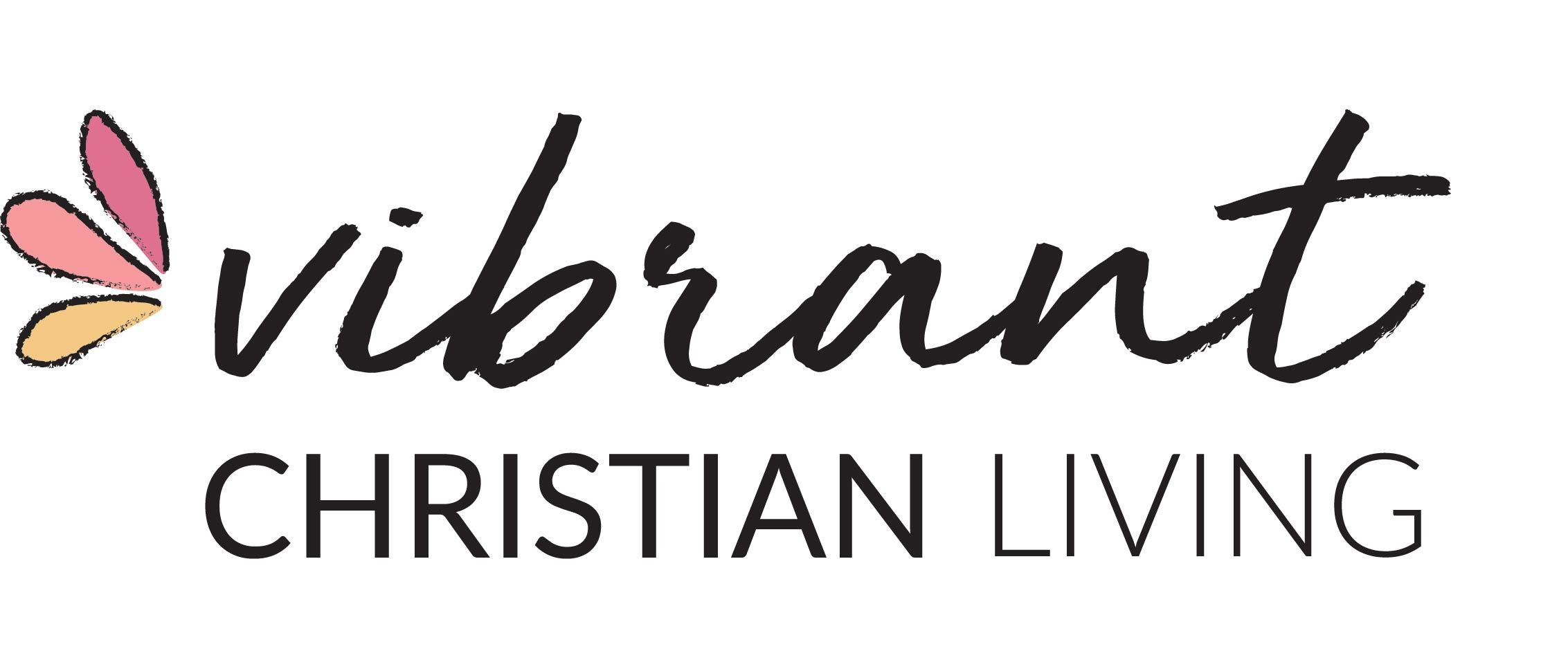Father wounds can deeply impact our lives and greatly affect our mindset as Christian women, especially in our ability to accept God’s love. However, many of us aren’t aware of the damaging effect of father wounds or how these emotional wounds may be impacting our relationships with others. In this episode Alicia speaks with Kia Stephens about what father wounds are, the different types of wounds that could stem from these emotional or childhood traumas, and how they could be impacting our ability to embrace God’s love. If you struggle with father wounds, this episode is a great way to discover how to begin the healing process.

WHAT YOU’LL LEARN:
- [04:45] What is a father wound?
- [08:11] How might father wounds relate to the “pick me girl” trend and other issues around womens’ identity in culture?
- [10:59] Why deeper issues surface when we’ve spent years being “fine” after childhood trauma
- [16:45] Kia’s story: How she overcompensated for father wounds in her own life
- [24:49] How do father wounds impact our ability to accept God’s love?
- [30:11] Kia’s advice on taking the first steps in addressing father wounds
- [42:39] Kia’s message to women struggling with father wounds
- [45:17] Next Steps: How to find healing for father wounds
[04:45] What is a father wound?
A father wound is synonymous with father absenteeism, Kia explains. Whether you have experienced father absenteeism by way of divorce, physical or emotional abandonment, abuse, incarceration, drug addiction or alcoholism, an affair with another woman, or premature death, this all ties back to the father wound.
Some of the biggest trauma wounds women struggle with are love wounds, trust wounds, affirmation wounds, and acceptance wounds. Each of these wounds can impact our relationship with God as the biological father provides the lens in which we view our Heavenly Father.
[08:11] How might father wounds relate to the “pick me girl” trend and other issues around womens’ identity in culture?
Kia shares her take on the phenomenon of “pick me girls”: a trending behavior of young women who will do anything to receive affirmation and validation from men, especially on social media. This topic touches Kia’s heart deeply, as she can’t help but wonder if anyone is asking why this phenomenon is occurring.
“Why are these girls on TikTok trying to derive affirmation from random strangers and others who really do not have the authority or the character to give them affirmation?” Kia says. She points out that if a man is only providing affirmation based on outward appearance, then that's something that's not sustainable. That means that appearance would have to remain attractive to them in order to keep the cycle of affirmation going, she notes. When Kia sees situations like these, she wonders where the father is and what role he played in raising the young women.
The issue of father wounds is incredibly relevant, she says, especially as we continue to see girls wear less and less clothing. It can be a great thing when we do things to enhance our beauty for ourselves, like wearing makeup or false lashes if it makes us feel good, but when we're doing it because we feel like we have to, and we don't know who we are without the attention or validation from others, it becomes a problem. Behavior like this could be an indicator that there is a father wound that exists in the form of an affirmation wound, she says.
[10:59] Why deeper issues surface when we’ve spent years being “fine” after childhood trauma
Kia feels that most people live in blissful avoidance of a father wound or other trauma until they’re forced to face it. We go about our lives masking and even believing that we’re fine, she says. We believe that our traumas have no impact on us, until something happens in our journey that triggers a memory or flashback and causes emotions to resurface and even spiral. It all comes rushing back, and then we realize that we’re not okay.
This is why taking time to walk through the unearthing process is so important, so that we know how to keep living and moving forward in a healthy way after the trauma or after the emotions from a previous trauma are triggered.
We bury our memories and our emotions because we’re in survival mode. We have things to do. However, Kia believes the biggest obstacle in our healing is not taking the time to address how we’re actually being impacted by our trauma, not so we can continue to live in it, but so that we can continue to move forward.
[16:45] Kia’s story: How she overcompensated for father wounds in her own life
We may not always be aware of how father wounds affect our lives. Kia shares that her father wounds showed up as the need for affirmation, validation, and love. She even discovered that she had carried her father wounds into her marriage.
Like many women, Kia fantasized over marriage. She imagined something similar to a Cinderella story, riding off into the sunset with the man that she loved. When she married, she placed a lot of demands on her spouse that he was not able to fulfill. She had given him the responsibility of meeting all of her needs and, because of this, her day to day emotions were reliant on his reactions and responses. Kia began to realize by way of the Holy Spirit and through counseling, that we can't give that type of power to anyone, and that even in marriage, God is still our source and our soul.
When we place that responsibility onto our spouses instead of leaning on and trusting in our heavenly Father, we are basing our worth and feelings on someone who is also imperfect, Kia adds. Our husbands may be walking through their own difficult experiences. They may have had a bad day at work. They may respond out of anger with a boss or frustration with sinful humanity. We still have to know who we are as God's beloved daughters, apart from what others say or don’t say to us.
[24:49] How do father wounds impact our ability to accept God’s love?
Sociologists have long stated that, as humans, we perceive God as a father or a fatherly figure. Kia discovered this truth while in counseling at her church. This counseling helped her see how we place a father’s behavioral attributes, whether distant, dominant, passive, or aggressive, as attributes of God the Father.
Kia shares that her own father experience was that of an absent and passive father. This showed up in her relationship with God by presenting as the thought that maybe God wasn’t really that interested in her life. She believed in Him and knew He was real, but the more intimate issues of her heart were impacting her belief and trust in her relationship with God. As the granddaughter of a Baptist pastor, she continued to attend church almost every day, but there was a disconnect in her relationship with God. Kia shares that it took her being willing to acknowledge and wrestle with those thoughts of anger and disappointment and to have those conversations with God to allow God to teach her who He is and who He says He is within scripture.
[30:11] Kia’s advice on taking the first steps in addressing father wounds
Kia says that when we identify the types of wounds that we have, whether we carry love, affirmation, provision, or rejection wounds, we have to begin the difficult work of renewing our mind. Romans 12:2 reminds us not to conform to this world, but to be transformed by the renewing of our minds. This includes the every day, minute by minute, second by second conscious decision to choose to stake our trust in what the Word of God says over what we’re thinking in our minds or feeling in our hearts.
We cannot expect ourselves to allow God to be trustworthy, if we’re so consumed by our own emotions that we don't give Him enough space to show Himself to be trustworthy. We have to come to a point where we’re willing to trust in Him and have faith that He can be trusted to care for us, even when we’ve been hurt by our earthly father figures in the past.
The first step in addressing father wounds is to acknowledge that we are wounded, Kia says. While it seems like a small step, just admitting that someone hurt us and how they hurt us can make an enormous impact on our healing. Whether we admit it out loud to God or a close friend, or even within the pages of our journal, acknowledgement is the place to start.
The second step Kia encourages women to take is to invite the Holy Spirit into the healing journey. He is known as a wonderful counselor, and will direct you to the resources that will be the most helpful for you. It may be a book, a licensed professional counselor, a podcast, a friend or a pastor, but the Holy Spirit will guide you to the next step in your healing process.
Verses and questions for reflection:
- Romans 12:2
- John 10:10
- Psalms 147:3
- Is it more comfortable for me to stay in the pain and discomfort or to move and take a risk by trusting in God?
- Do I want to stay angry the rest of my life and keep living in the trauma and emotion, or what can I do to move forward?
[42:39] Kia’s message to women struggling with father wounds
If you are dealing with, struggling with or healing from any type of trauma or father wound, Kia wants you to know that you are not a victim – you are a survivor. You may have a long journey ahead of you with many more miles of healing, and more hardships to walk through, but you survived. Whether your father was an alcoholic, drug addict, or if he just never came to your volleyball game, whether he called you fat at the dinner table, or left your family – you are a survivor. You are a beloved daughter of God and He wanted you here. He formed you in your mother's womb. He had an intention for bringing you into this world, so no matter your circumstance, know that God wanted you here.
[45:17] Next Steps: How to find healing for father wounds
If listening to this episode stirred up emotions for you, Alicia would like to invite you to take the next step in healing from emotional and childhood trauma caused by father wounds and seek out support. Kia’s book Overcoming Father Wounds is a great first step to feel not alone in this journey.
If you feel ready to start your own healing work, and would like some biblical encouragement along the way, Alicia encourages you to find a good Christian counselor in your area. If you aren’t aware of a counselor that would fit your needs, she recommends Faithful Counseling, an online Christian counseling service that is available to people across the globe.
Alicia also reminds us that it takes time to get healing from traumas and hardships. God may have given us a vision of how that healing may come through telling our story to others, such as Kia has done in her book, and that doesn’t happen overnight either. For Kia, her dream of writing a book took her about 20 years to complete, and it included putting a spotlight on some of the hardships she experienced in her life.
It can be easy for us to begin to question things when dreams don’t come to fruition right away, especially when we feel them in our hearts so strongly, but we can take comfort in knowing that God has perfect timing. Healing takes time. Dreams take time. Don’t be afraid to bring those situations and thoughts before God and let Him take care of the timing.
RESOURCES:
Overcoming Father Wounds: Exchanging Your Pain for God’s Perfect Love by Kia Stephens
CONNECT WITH KIA:
OTHER RELATED EPISODES:
Ep 191: Pt 1: How Can I Believe that God Loves Me (In My Head and My Heart)?”
Ep 192: Pt 2: “How Can I Believe that God Loves Me (In My Head and My Heart)?”
194: 5 Bible Verses on Love to Meditate on When You Need Comfort
204: 6 Questions to Ask When Your Emotions Feel Overwhelming
Write a 5-Star Rating and Review and Get a Free Gift: 50 “I Am” Declarations ($47 value)!
If you love this podcast, would you take a second to write a five star rating and review? If so, I’d love to send you a free gift: the 50 ‘I Am’ Declarations. This is an audio and written statement of who we are in Christ, and includes Bible verses and powerful statements about identity that you can proclaim over your life.
To get the free gift ($47 value), take a screenshot of your five star rating and review and then email that screenshot to Hello@VibrantChristianLiving.com, and we’ll send you access to the resource! Thank you again for helping us get the word out about the podcast in a bigger way!

